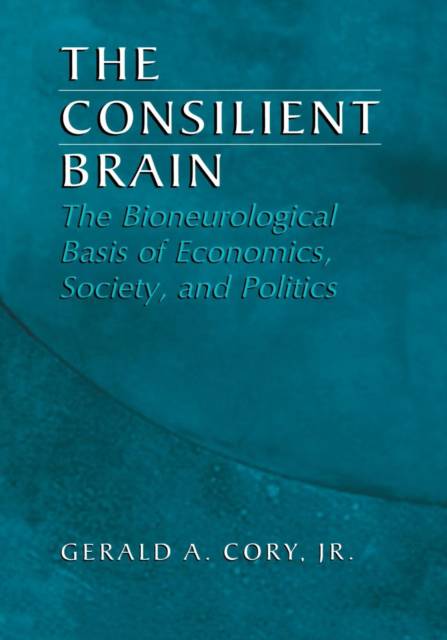
- Afhalen na 1 uur in een winkel met voorraad
- Gratis thuislevering in België vanaf € 30
- Ruim aanbod met 7 miljoen producten
- Afhalen na 1 uur in een winkel met voorraad
- Gratis thuislevering in België vanaf € 30
- Ruim aanbod met 7 miljoen producten
Zoeken
The Consilient Brain
The Bioneurological Basis of Economics, Society, and Politics
Gerald A Cory Jr
Paperback | Engels
€ 153,95
+ 307 punten
Uitvoering
Omschrijving
The present work is the third in a series constituting an extension of my doctoral thesis done at Stanford in the early 1970s. Like the earlier works, The Reciprocal Modular Brain in Economics and Politics, Shaping the Rational and Moral Basis of Organization, Exchange, and Choice (Kluwer AcademicfPlenum Publishing, 1999) and Toward Consilience: The Bioneurological Basis of Behavior, Thought, Experience, and Language (Kluwer AcademicfPlenum Publishing, 2000), it may also be considered to respond to the call for consilience by Edward O. Wilson. I agree with Wilson that there is a pressing need in the sciences today for the unification of the social with the natural sciences. I consider the present work to proceed from the perspective of behavioral ecology, specifically a subfield which I choose to call interpersonal behavioral ecology. Ecology, as a general field, has emerged in the last quarter of the 20th century as a major theme of concern as we have become increasingly aware that we must preserve the planet whose limited resources we share with all other earthly creatures. Interpersonal behavioral ecology, however, focuses not on the physical environment, but upon our social environment. It concerns our interpersonal behavioral interactions at all levels, from simple dyadic one-to-one personal interactions to our larger, even global, social, economic, and political interactions.
Specificaties
Betrokkenen
- Auteur(s):
- Uitgeverij:
Inhoud
- Aantal bladzijden:
- 234
- Taal:
- Engels
Eigenschappen
- Productcode (EAN):
- 9781461348986
- Verschijningsdatum:
- 24/09/2012
- Uitvoering:
- Paperback
- Formaat:
- Trade paperback (VS)
- Afmetingen:
- 178 mm x 254 mm
- Gewicht:
- 444 g

Alleen bij Standaard Boekhandel
+ 307 punten op je klantenkaart van Standaard Boekhandel
Beoordelingen
We publiceren alleen reviews die voldoen aan de voorwaarden voor reviews. Bekijk onze voorwaarden voor reviews.











